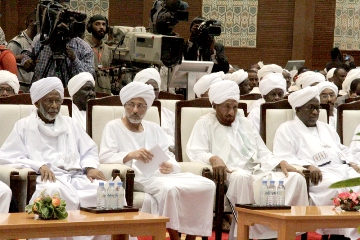Sudan’s national dialogue due to start later this month, says NCP
May 12, 2014 (KHARTOUM) – Sudan’s ruling National Congress Party (NCP) has announced that national dialogue will convene before the end of the month, warning opposition parties which refused to join against attempting to sabotage the process.

He noted that his party cannot force opposition parties to join the national dialogue, asserting that any attempt to undermine it will not succeed because all political and social forces are supporting it.
The opposition parties which agreed to take part in the dialogue have so far failed to name their representatives in the dialogue mechanism.
While NCP’s deputy chairman and presidential assistant, Ibrahim Ghandour, unveiled that pro-government parties have named their representatives, a senior official told Sudan Tribune that differences also exist within the government on naming their delegates.
The dialogue mechanism was decided so that it would include seven members from the government side and an equal number from the opposition.
A senior official at the opposition Popular Congress Party (PCP) told Sudan Tribune on Monday that their attempts to convince the Sudanese Communist Party (SCP) and Arab Ba’ath Party (ABP) to engage in the dialogue had failed, stressing that national dialogue will continue and would not wait for them.
Meanwhile the opposition parties which agreed to take part in the national dialogue said they will name their representatives in the dialogue mechanism on Wednesday.
The pro-government Sudan Media Center (SMC) quoted the deputy chairman of the opposition Reform Now Party (RNP), Hassan Osman Rizg, who will chair the meeting on Wednesday, as saying that the opposition will name its representatives in the meeting.
He underscored that three committees were formed in order to push forward the dialogue including a liaison committee with the opposition parties which refused to join the dialogue inside Sudan and abroad besides a committee for creating a conducive atmosphere for dialogue and a third one to develop proposals for the dialogue mechanism secretariat.
Rizg called upon government parties to name their representatives in the dialogue mechanism as soon as possible, saying their meeting on Wednesday will discuss results of contacts with opposition parties which refused to join the dialogue besides discussing proposals to engage civil society organisations in the dialogue, including youth, student and women’s groups.
Meanwhile, the opposition alliance of the National Consensus Forces (NCF) notified the European Union (EU) ambassadors of its reservations toward the government’s dialogue initiative.
NCF’s chairman, Farouq Abu Issa, said that a delegation from the opposition met with the EU ambassadors and convinced them with four conditions set by the NCF for engaging in the dialogue.
He pointed that they agree with the rebel alliance of the Sudan Revolutionary Front (SRF) that dialogue should only be meant for dismantling the regime and restoring rule of law, saying they will not be fooled by the government’s announcements.
Meanwhile, the PCP’s political secretary, Kamal Omer, has strongly criticised their former allies in the NCF expressing resentment of their conditions for joining the national dialogue including cancellation of laws restricting freedoms.
He said opposition parties must practice democracy within its ranks, affirming that they wouldn’t allow holding national dialogue abroad and wouldn’t succumb to foreign will.
Omer, who spoke at a media forum organised by the NCP media secretary yesterday, further underscored they wouldn’t allow changing the regime by force of arms in order to achieve democracy.
He said the PCP’s decision to join the dialogue “surprised” their peers in the opposition alliance, adding that PCP leader Hassan al-Turabi prevented bloodshed of the Muslim Brotherhood inside and outside Sudan and was able to move all issues into one direction.
“Any talk about prosecuting political Islam is illogical and we will challenge anyone who seeks to carry it out,” he said.
The Islamists split in 1999 following a bitter power struggle between Bashir and Turabi, with the latter subsequently ousted from his post as parliament speaker.
Turabi later established the PCP and has since been a vociferous critic of the very regime for which he orchestrated the army-backed seizure of power in 1989.
Following the toppling of Egyptian president Mohamed Morsi, who belonged to the Islamist Muslim Brotherhood, Omer said that they were disappointed that Sudanese opposition backed his ouster even though he was democratically elected.
The PCP official praised the NCP for allowing political freedoms, saying opposition parties hold public meetings and their members appear in state-run media.
Last January, Bashir called on political parties and armed groups to engage in a national dialogue to discuss four issues, including ending the civil war, allowing political freedoms, fighting against poverty and revitalising national identity.
He also held a political roundtable in Khartoum last month with the participation of 83 political parties. The opposition National Umma Party (NUP) and the PCP are the only major opposition parties to accept Bashir’s call for national dialogue so far.
The opposition alliance of the National Consensus Forces (NCF) boycotted the political roundtable, saying the government did not respond to its conditions.
The NCF wants the NCP-dominated government to declare a comprehensive one-month ceasefire in Darfur, South Kordofan and Blue Nile. In addition it has called for the issuing of a general amnesty, allowing public freedoms and the release of all political detainees.
(ST)
